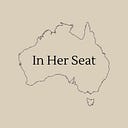Jess Pugh: Responsibility and outcomes
“Community work is an important precursor to being elected to parliament, because it means that when you’re elected, you’re already across the issues of the community”
Almost 100 years ago, Edith Cowan became the first woman elected to an Australian parliament, in March 1921.
In Her Seat is asking as many currently serving female politicians as we can how they view gender equality, politics and their impact.
This is a non-partisan project that is soliciting contributions from women in all parties, or none at all, in every parliament.
Jess Pugh is the Member for Mount Ommaney in the Queensland Parliament.
Jess entered parliament in 2017 and quickly earned a reputation for getting outcomes for her electorate.
Before entering parliament, Jess worked as transport policy adviser and then as a business manager in the hospitality industry. For her, she saw politics as a natural training ground for politics given the wide range of people you meet and their varying demands.
Jess was also an active volunteer, particularly through P and C’s and school education.
In parliament, Jess has worked to achieve millions of dollars investment in transport and infrastructure for her electorate, as well as support for small businesses.
What does gender equality mean to you?
Put simply, it means everyone has the opportunity to experience the highs and lows of both traditional gender roles.
I’m about to have my third child and I want my husband to be able to have the experience of being a hands-on dad and bonding with our daughter, being able to take time off to be with her.
Likewise, me being a mother should not exclude me from the traditionally male-dominated field of politics, and in fact my experiences as a mum give me a unique perspective as an MP.
Both genders gain so much when they can share in these experiences, and I want to see this improved.
Which female politicians have inspired or encouraged you?
Our Premier, Annastacia Palaszczuk is a huge inspiration to me, particularly this year when she has had to endure serious criticism and hold firm to her position to abide by the Chief Health Officer’s advice.
My only concern in that other young women watching that level of sustained pressure may decide that a career in politics is not for them, but this is exactly why we need to do all we can to encourage women in politics.
What inspired you to serve your community?
I’m inspired by many of the local women I meet in my community every day, working on the P and C’s, the soccer clubs and often also balancing work and family too.
This was my entry into community leadership and then politics, first as a P and C President, then a candidate for the Labor Party. I think community work is an important precursor to being elected to parliament, because it means that when you’re elected, you’re already across the issues of the community and you can get started immediately.
Being able to deliver big projects for my community is also reward, but it’s also about helping people with the smaller issues and being that someone in the community that people can turn too for advice and support.
What are the most important contributions you are making in Parliament?
Firstly, just by being there as a young woman, a young mum, I’m sending a signal to other young women that they can do it too.
Secondly, by being a female voice in parliament, I can give voice to issues around female-dominated areas like consent laws, maternity care, and so much more.
But we really need a critical mass of women in parliament to effectively address these issues.
What is next for gender equality in politics?
Obviously we need to have 50% female representation in Parliament, right across the political spectrum.
It’s only sensible that the Parliament should reflect society and we still have a way to go in this regard.
In Her Seat interviews can be accessed here
